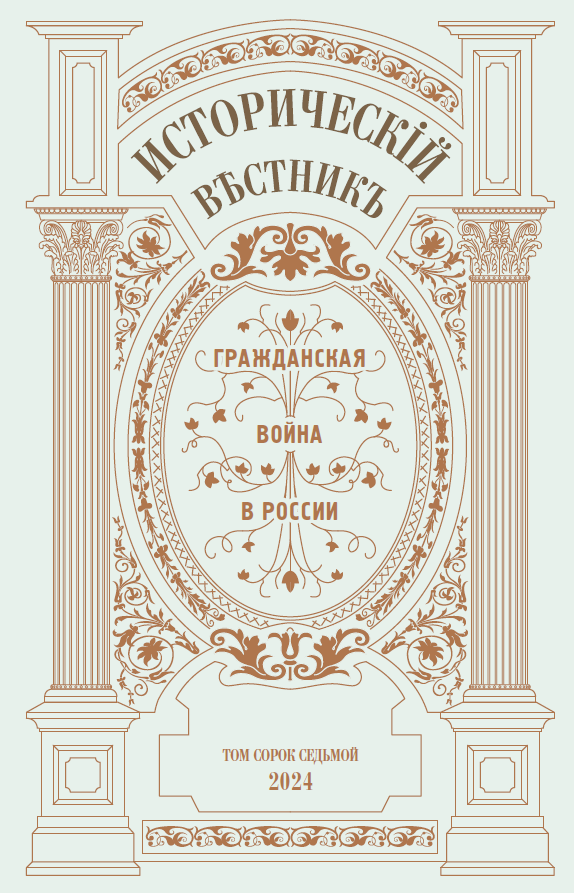The Civil War in Russia
VOL. 47 [194]
march 2024
EDITORIAL
The 47th issue of the Historical Reporter is dedicated to the Russian Civil War of 1917–1922. Our journal has repeatedly delved into this topic, which is truly inexhaustible and continues to generate long-lasting interest among specialists and general public alike. The fratricidal conflict left not only enduring moral preferences but also vast amounts of historical materials yet to be studied, forgotten heroes from both sides, and lesser-known aspects related to foreign influences on the Russian Revolution and the Civil War. Until recently, this topic was subjected to intense ideological pressure from both sides, with authors from the «red» and «white» factions often lacking objectivity in their assessments of events and individuals. Traces of ideological division, and at times blatant propaganda, were also evident in the works of many foreign researchers. Indeed, an impartial and objective examination of that era is happening now, and our journal is striving to contribute to the research of this memorable and tragic period in Russian history.
The issue begins with an article by Pavel A. Novikov, which focuses on the organization of the anti-Bolshevik resistance in the Irkutsk Military District in 1918–1919 and the White command’s attempts to change the course of the armed conflict. A brief retrospective of the military and infrastructural development of Eastern Siberia from 1884 to 1917 is also of significant interest. The next piece by Ruslan G. Gagkuev explores the potential involvement of the British military mission in Siberia in Admiral A. Kolchak’s rise to power in 1918. This paper continues our series of publications examining the impact of external factors on the Russian Revolution and the Civil War. An article by Irina V. Fedotova is dedicated to the portrayal of M. Tukhachevsky in the Soviet press from 1918 to 1923. It examines the transformation of the future marshal’s image from a relatively unknown public figure to one of the key heroes of the Red Army, symbol of the «revolutionary war». The remarkable and complex character of Tukhachevsky, who has recently been subject to a radical reevaluation, will undoubtedly continue to captivate historians. Aleksey V. Sushko’s paper explores the phenomenon of Siberian Orthodox periodicals during the Civil War. Using Siberia as an example, the author highlights the need to study this issue as a nationwide phenomenon. An article by Viktoriya V. Nazyrova and Dmitry I. Petin continues the discussion on the Civil War in Siberia, addressing issues related to the activities of the infamous Czechoslovak Corps and its anniversary coverage in the press of White Siberia. This article will be particularly interesting to experts in historical imagology and cultural anthropology. Yuri S. Pyltsyn’s article delves into the history of the Terek Peoples’ Congresses and the role of the Cossacks. It pays special attention to the strategies of the Bolsheviks, who ultimately managed to use the Congresses as a tool for Sovietizing the region. Alexander S. Puchenkov’s paper explores the life of the Red Army commander Ivan Sorokin. During the Soviet era, this exceptional commander was labeled a traitor and betrayer of the revolutionary cause. However, contemporary historiography paints a different picture of him as a talented military leader and a true people’s leader, with no documented evidence to support claims of his betrayal and complicity with the Whites. Andrey V. Ganin has contributed two pieces to this issue: the first one is about the nearly forgotten Red Army commander A. Kharchenko and his tragic fate, while the second one sheds light on a lesser-known aspect of the Civil War — the conspiracy of engineer N. Alekseev in Tsaritsin in 1918. Using new documents, the author attempts to verify the existence of the conspiracy and understand its nature. Sergei A. Mironiuk revisits the topic of British involvement in the Civil War, focusing on British intervention policies from 1917 to 1919, in his article. The paper examines the stages and characteristics of British interference in Russian internal affairs. Most of the archival documents, primarily British ones, are being introduced into Russian academic discourse for the first time. In his article, Pyotr N. Bazanov refers to the legacy of the Russian historian N. Ulyanov and analyzes his perspective on the origins of Ukrainian separatism. The article uses papers by the historian from rare, limited-edition publications of the Russian Diaspora. The issue concludes with a piece by Sergey V. Devyatov, Valentin I. Zhilyaev and Vladimir A. Nevezhin, which discusses the translation of the National Anthem of the Soviet Union into English for its promotion in the UK and the USA. The paper is based on materials from the Russian State Archive of Social and Political History and the Archive of Foreign Policy of the Russian Federation. Most of the materials, including the decision of the Secretariat of the Central Committee of the All-Union Communist Party (Bolsheviks) from January 19, 1944, on the establishment of a commission for translating the Anthem into foreign languages, are being introduced into academic discourse for the first time.
The editorial board of the journal extends its gratitude to all the authors of this issue for their contributions and is confident that it will significantly contribute to the study of Russian history.
Alexey E. Titkov, Editor-in-Chief of the Historical Reporter.
CONTENTS
Pavel A. Novikov. Anti-Bolshevik Military Construction and Combat Operations: Irkutsk Military District, 1918–1919
Irina V. Fedotova. Image of M.N. Tukhachevsky in the Soviet Press 1918–1923
Aleksey V. Sushko. The Phenomenon of Siberian Orthodox Periodicals During the Civil War in Russia
Viktoriya V. Nazyrova, Dmitry I. Petin. «In the Glorious Days of our Liberation»: Coverage of the Anniversary of the Performance of the Czechoslovak Corps in the Press of White Siberia
Yuri S. Pyltsyn. Swearing falsely in making a covenant (Hos. 10:4). Congress of Peoples of Terek and Terek Cossacks
Alexander S. Puchenkov. The Red Commander-in-Chief Ivan Sorokin in the Perception of Contemporaries
Andrey V. Ganin. «The Audience Shouted Demanding my Immediate Execution…». Commander A.I. Kharchenko in-between the Reds and the Whites
Andrey V. Ganin. The Conspiracy Case of Engineer N.P. Alekseev in Tsaritsyn, August 1918: Myth or Reality?
Sergei A. Mironiuk. British Intervention Policy in Russia (November 1917 — December 1919) as a Factor of the Civil War: Stages and Features
Pyotr N. Bazanov. Independent Ukraine — the main factor for the New Civil War, Based on the Writings by Historian Nikolai I. Ulyanov
SOVIET CHRONICLES
Sergey V. Devyatov, Valentin I. Zhilyaev, Vladimir A. Nevezhin. «An Unbreakable Union of Free Republics...» in Clear English. The Role of Soviet Diplomats in Promoting the USSR National Anthem In the UK and the USA



